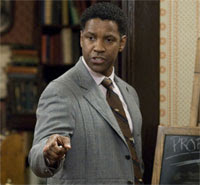
My friends know that Denzel Washington in my favorite actor. I haven't seen the new movie,
The Great Debaters, and I didn't see
American Gangster. I'll probably go and see this new movie once the holiday traffic calms down. It opens on Christmas Day.
I came across this really interesting essay by
Mark Anthony Neal, a cultural critic and Professor at Duke University. I've always admired the roles Denzel has played---which is one reason why I have not seen American Gangster yet. Neal's take on the matter is intriguing. The text from his blog follows. The full essay appeared in the
Washington Post on December 23.
RACE MAN
Does Denzel Always Have to Represent?
by Mark Anthony Neal
Sunday, December 23, 2007; Page B02
For most of his career, Denzel Washington has been the epitome of a "race man" -- a well-mannered, well-intentioned role model thoroughly committed to black uplift. He's maintaining that tradition in "The Great Debaters," a new film in which he plays a champion debate coach in the segregated South.
But his recent portrayal of the murderous Harlem drug lord Frank Lucas in "American Gangster," following his Oscar-winning performance as the corrupt cop Alonzo in "Training Day," has shaken his standing as a race man -- and has prompted speculation that, after years of playing characters who symbolized African Americans' mainstream acceptance, he's finally selling out to a commercial culture eager to make a buck off of portraying black men as thugs.
That's not how I see it. To me, the more important question that Washington's career choices raise is: Why, as the nation grows to appreciate the many different ways of being black, do we still need race men at all?
"Race man" is a term from the beginning of the 20th century that describes black men of stature and integrity who represented the best that African Americans had to offer in the face of Jim Crow segregation. It has lost some of its resonance in a post-civil rights world, but it remains an unspoken measure of commitment to uplifting the race. Race men inspire pride; their work, their actions and their speech represent excellence instead of evoking shame and embarrassment. Thus the pundit Tavis Smiley and the Rev. Jesse Jackson (even with an illegitimate child) can be race men, whereas the comedian Dave Chappelle and the rapper/mogul Jay-Z can never be.
Sidney Poitier had impeccable race-man cred. The legendary black actor was one of the first to achieve mainstream success, and he never wavered. In films such as "The Defiant Ones" (1958), "In the Heat of the Night" (1967) and even "Guess Who's Coming to Dinner" (1967), he made us proud to be black. At the height of the black-power movement, when his articulate, educated and even affable characters were often measured against fiery political icons such as Malcolm X and the Black Panther leader H. Rap Brown, some blacks felt ambivalent about Poitier. But the actor's willingness to support the civil rights movement appeased those who wanted a more radical image.
There's little doubt that Poitier and contemporaries such as James Earl Jones and Raymond St. Jacques influenced Washington in his choice of roles. Early in his career, he was often drawn to the part of the heroic do-gooder; his roles in "Cry Freedom" (as the martyred anti-apartheid hero Steve Biko) and the Civil War epic "Glory" (which won him a 1990 Academy Award for best supporting actor) displayed his gravitas. The tear he shed when his character, Pvt. Trip, was flogged in "Glory" lent black men a depth of humanity not seen in American cinema before or since.
In his collaborations with director Spike Lee, Washington complicated the race-man ethos. No longer defined solely by their willingness to stand up for their race, characters such as Bleek Gilliam ("Mo' Better Blues"), Jake Shuttlesworth ("He Got Game") and Detective Keith Frazier ("Inside Man") represented the new race man, whose main emphasis was on being manly. These characters were self-absorbed and selfish and demanded the respect they thought they deserved. Still, many black audiences embraced them, if only because Washington had earned their trust, especially after his signature collaboration with Lee on the film "Malcolm X."
But that trust began to erode with Washington's portrayal of Alonzo in "Training Day." When he finally won the coveted Best Actor Oscar for that role, on the same night that Halle Berry won Best Actress, much was made of their being rewarded for portraying characters who demeaned African Americans. And yet it was easy to give Washington a pass, because the Motion Picture Academy had ignored his more celebrated roles as Rubin "Hurricane" Carter and Malcolm X.



